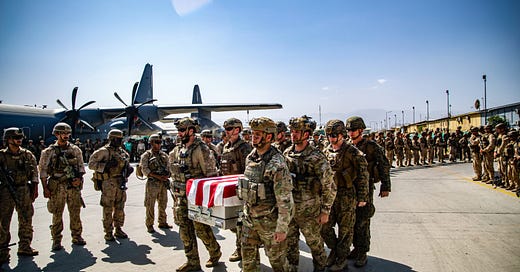Why Do Warriors Need a Code?
and why our nation's civilian leaders must adhere to that same code
Throughout history, warriors have adhered to a code of conduct, guidelines that define honor, duty, and morality in the crucible of war. These codes, evident in works like The Iliad, by Homer, The Theater of War by Bryan Doerries, and The Ajax Dilemma by Paul Woodruff, serve as moral compasses, anchoring individuals to higher ideals amid chaos of combat. The tragic events from a suicide bombing attack on August 26th, 2021 at 13:20 UTC that killed 13 U.S. service members at the Kabul Airport Abbey Gate demonstrated the exemplary code of conduct of those marines who served under exhausting and chaotic conditions. They exhibited moral courage in the same way that Medal of Honor recipient VADM James Stockdale USN (ret) reinforced upon his return as a Vietnam POW. The Mainers of Ghost Company also demonstrated contemporary relevance of such codes of conduct, particularly by Company Commander Maj Geoff Ball, whose actions illustrated the necessity in guiding warriors through moral and operational challenges even when leadership at the highest levels of government falters.
Homer’s Iliad paints a vivid picture of warriors bound by unwritten rules of honor. Achilles, despite his wrath, returns Hector’s body to Priam, demonstrating respect for human dignity even amid enmity. This narrative reenforces that a warrior’s code is not merely about winning but preserving humanity in victory and defeat. Similarly, The Theater of War explores how ancient Greek tragedies like Ajax mirror the psychological burdens of modern soldiers. Ajax’s struggle with pride and his ultimate demise underscores the consequences of losing one’s moral anchor. It is a reminder that a warrior’s code must address both external conflicts and internal struggles.
Paul Woodruff’s The Ajax Dilemma delves deeper into fairness and leadership in war. Woodruff argues that distributing honors based on merit, as opposed to favoritism, fosters unity. The absence of a code that upholds equity can fracture even the strongest forces. This lesson resonates with the failures of civilian leadership that led to the tragedy at Abbey Gate during the chaotic U.S. withdrawal from Afghanistan. While the Marines stationed there displayed extraordinary courage and discipline, the strategic decisions by the National Security Council and President Biden’s administration led to unnecessary risks and devastating losses. Poor strategic objectives, lackluster planning by the Department of State, and mismanagement of the withdrawal timeline left service members exposed, ultimately culminating in the deaths of 12 Marines and one Navy Corpsman and over 150 Afghan civilians. These failures highlight the devastating consequences of abandoning sound principles of strategy and accountability – a code of conduct necessary at the national security level.
VADM Stockdale, a stoic philosopher and Medal of Honor recipient, exemplified the power of a warrior’s code during his imprisonment in Vietnam. Stockdale’s adherence to principles, rooted in courage and resilience, provided him and those who were imprisoned with him with a sense of purpose amidst unimaginable suffering by their captors. His assertion, “I think character is permanent, and issues are transient” encapsulates the importance of enduring values that sustain warriors under duress.
The events at Abbey Gate stand as a stark reminder that when strategic leadership collapses, such as at the National Security Level, even the most well-led and disciplined warriors can be rendered vulnerable. The courage of the 13 service members who gave their lives that day shines as a testament to the enduring necessity of a warrior’s code that came from within themselves, through training and perseverance. However, their sacrifices also highlight the failure of senior policymakers to embody the very values warriors adhere to and demand: foresight, accountability, and commitment to the mission and those who serve. James B. Stockdale illustrates this with his insights from his 1996 Hoover Institution publication Thoughts of a Philosophical Fighter Pilot.
“Numberless soldiers have died, more or less willingly, not for country or honor or religious faith or for any other abstract good, but because they realized that by fleeing their posts and rescuing themselves, they would expose their companions to greater danger. Such loyalty to the group is the essence of fighting morale. The commander who can preserve and strengthen it knows that all other physical and psychological factors are little in comparison. The feeling of loyalty, it is clear, is the result and not the cause of comradeship. Comrades are loyal to each other spontaneously and without any need for reasons. Men may learn to be loyal out of fear or rational conviction, loyal even to those they dislike.”
In war, where uncertainty and chaos reign, a code offers clarity. It transforms soldiers into warriors not just instruments of violence but instead stewards of order, discipline, and justice. As Homer, Doerries, Woodruff, and Stockdale illustrate, the foundation of this code of conduct preserves its timeless virtues: respect, fairness, and resilience from within. These virtues must serve as a standard for leadership at each and every level. Without it, warriors risk not only losing battles but also being failed by those entrusted to lead them, as was tragically evident at Abbey Gate.
Joint Task Force-Crisis Response personnel carrying the remains of fellow service members killed in the airport attack, 27 August 2021 (Photo by 1st Lt. Mark Andries).




